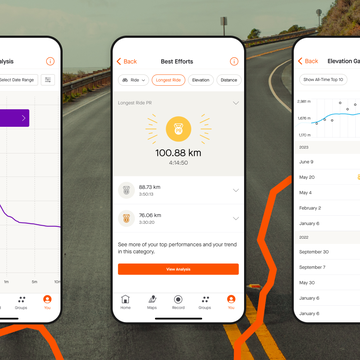For those who are overweight or obese, it may be frustrating to increase your activity—say, you start a riding plan—and still not see any movement downward on the scale. You know you should keep at it, but it can be difficult to stay motivated when you’re not seeing any outward results.
But this might help you continue getting on the bike: Being fit can seriously help your health, even if you are still carrying some extra weight, a new preliminary study presented at the American Heart Association’s annual conference suggests.
In the study, researchers from the University of Texas Southwestern Medical Center analyzed data from over 2,300 patients enrolled in the Dallas Heart Study. They split them into four groups based off their body mass index (BMI) and their fitness, which they gauged by performance on a treadmill test: non-obese and fit, non-obese and unfit, obese and fit, and obese and unfit.
The researchers discovered that obese people who are fit had less body fat, more lean muscle mass, and a lower resting pulse rate—a marker of efficient heart function—than non-exercisers who are also obese.
Particularly notable, these exercisers have better cardiovascular health, which can cause a cascade of beneficial effects, including longer life. That shows there may be some truth to being “fat but fit.” “Being fit is linked to beneficial physiological and cardiovascular changes, irrespective of BMI,” the researchers write.
The increase in lean muscle mass is an important key, said Salim Virani, M.D., a professor in cardiovascular research at Baylor College of Medicine who wasn’t involved in the study. That shift can boost metabolism, helping regulate your blood sugar spikes more effectively. As a result, that can decrease your risk of diabetes as well as heart conditions.
Bottom line? The takeaway from this research is that even if you are overweight or obese, you can still lower your risk of heart or stroke through physical activity—even if you don’t lose any weight, Virani said.
He emphasized that people who are overweight shouldn’t put off the start of a regular exercise regimen until they drop a few pounds through dietary changes.
“Most patients, even if obese, can generally get into some regular exercise routine,” he said. “Of course, one should gradually build this into the schedule. The key is gradual increase in duration and intensity. The important message is to get started with whatever activity one can tolerate.”
[Find 52 weeks of tips and motivation, with space to fill in your mileage and favorite routes, with the Bicycling Training Journal.]
Knowing that exercise improves health markers may be an incentive for those who are overweight and feeling frustrated about lack of “progress” when it comes to weight loss, he added.
“There are many health benefits of regular physical activity and exercise which go beyond weight loss,” said Virani. “Any amount of physical activity is better than no physical activity.”
Elizabeth Millard is a freelance writer focusing on health, wellness, fitness, and food.













